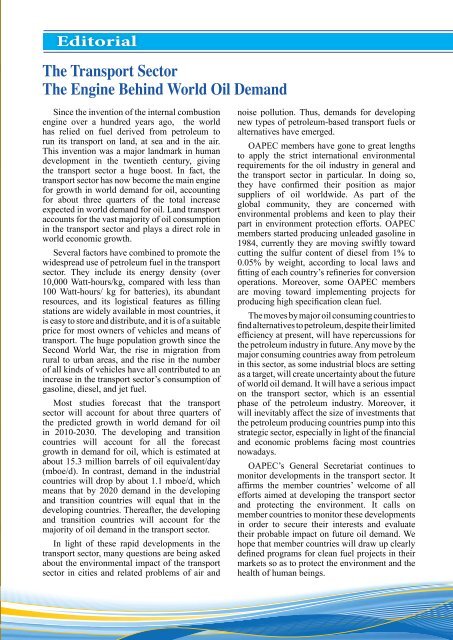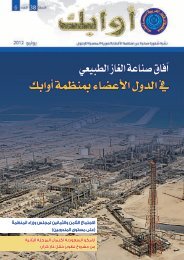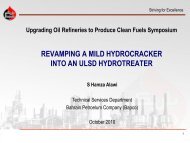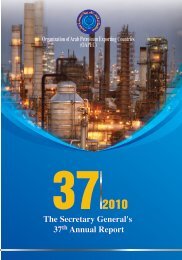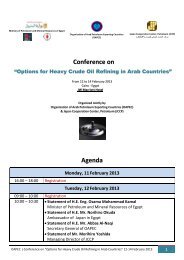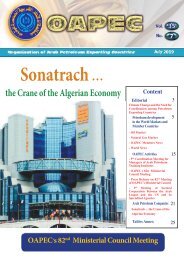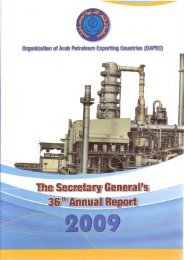ÙاطÙÙÙرة اÙØ·ÙÙÙب اÙعا٠ÙÙÙ٠عÙÙÙ٠اÙÙÙÙÙØ· - OAPEC
ÙاطÙÙÙرة اÙØ·ÙÙÙب اÙعا٠ÙÙÙ٠عÙÙÙ٠اÙÙÙÙÙØ· - OAPEC
ÙاطÙÙÙرة اÙØ·ÙÙÙب اÙعا٠ÙÙÙ٠عÙÙÙ٠اÙÙÙÙÙØ· - OAPEC
- No tags were found...
Create successful ePaper yourself
Turn your PDF publications into a flip-book with our unique Google optimized e-Paper software.
EditorialThe Transport SectorThe Engine Behind World Oil DemandSince the invention of the internal combustionengine over a hundred years ago, the worldhas relied on fuel derived from petroleum torun its transport on land, at sea and in the air.This invention was a major landmark in humandevelopment in the twentieth century, givingthe transport sector a huge boost. In fact, thetransport sector has now become the main enginefor growth in world demand for oil, accountingfor about three quarters of the total increaseexpected in world demand for oil. Land transportaccounts for the vast majority of oil consumptionin the transport sector and plays a direct role inworld economic growth.Several factors have combined to promote thewidespread use of petroleum fuel in the transportsector. They include its energy density (over10,000 Watt-hours/kg, compared with less than100 Watt-hours/ kg for batteries), its abundantresources, and its logistical features as fillingstations are widely available in most countries, itis easy to store and distribute, and it is of a suitableprice for most owners of vehicles and means oftransport. The huge population growth since theSecond World War, the rise in migration fromrural to urban areas, and the rise in the numberof all kinds of vehicles have all contributed to anincrease in the transport sector’s consumption ofgasoline, diesel, and jet fuel.Most studies forecast that the transportsector will account for about three quarters ofthe predicted growth in world demand for oilin 2010-2030. The developing and transitioncountries will account for all the forecastgrowth in demand for oil, which is estimated atabout 15.3 million barrels of oil equivalent/day(mboe/d). In contrast, demand in the industrialcountries will drop by about 1.1 mboe/d, whichmeans that by 2020 demand in the developingand transition countries will equal that in thedeveloping countries. Thereafter, the developingand transition countries will account for themajority of oil demand in the transport sector.In light of these rapid developments in thetransport sector, many questions are being askedabout the environmental impact of the transportsector in cities and related problems of air andnoise pollution. Thus, demands for developingnew types of petroleum-based transport fuels oralternatives have emerged.<strong>OAPEC</strong> members have gone to great lengthsto apply the strict international environmentalrequirements for the oil industry in general andthe transport sector in particular. In doing so,they have confirmed their position as majorsuppliers of oil worldwide. As part of theglobal community, they are concerned withenvironmental problems and keen to play theirpart in environment protection efforts. <strong>OAPEC</strong>members started producing unleaded gasoline in1984, currently they are moving swiftly towardcutting the sulfur content of diesel from 1% to0.05% by weight, according to local laws andfitting of each country’s refineries for conversionoperations. Moreover, some <strong>OAPEC</strong> membersare moving toward implementing projects forproducing high specification clean fuel.The moves by major oil consuming countries tofind alternatives to petroleum, despite their limitedefficiency at present, will have repercussions forthe petroleum industry in future. Any move by themajor consuming countries away from petroleumin this sector, as some industrial blocs are settingas a target, will create uncertainty about the futureof world oil demand. It will have a serious impacton the transport sector, which is an essentialphase of the petroleum industry. Moreover, itwill inevitably affect the size of investments thatthe petroleum producing countries pump into thisstrategic sector, especially in light of the financialand economic problems facing most countriesnowadays.<strong>OAPEC</strong>’s General Secretariat continues tomonitor developments in the transport sector. Itaffirms the member countries’ welcome of allefforts aimed at developing the transport sectorand protecting the environment. It calls onmember countries to monitor these developmentsin order to secure their interests and evaluatetheir probable impact on future oil demand. Wehope that member countries will draw up clearlydefined programs for clean fuel projects in theirmarkets so as to protect the environment and thehealth of human beings.


